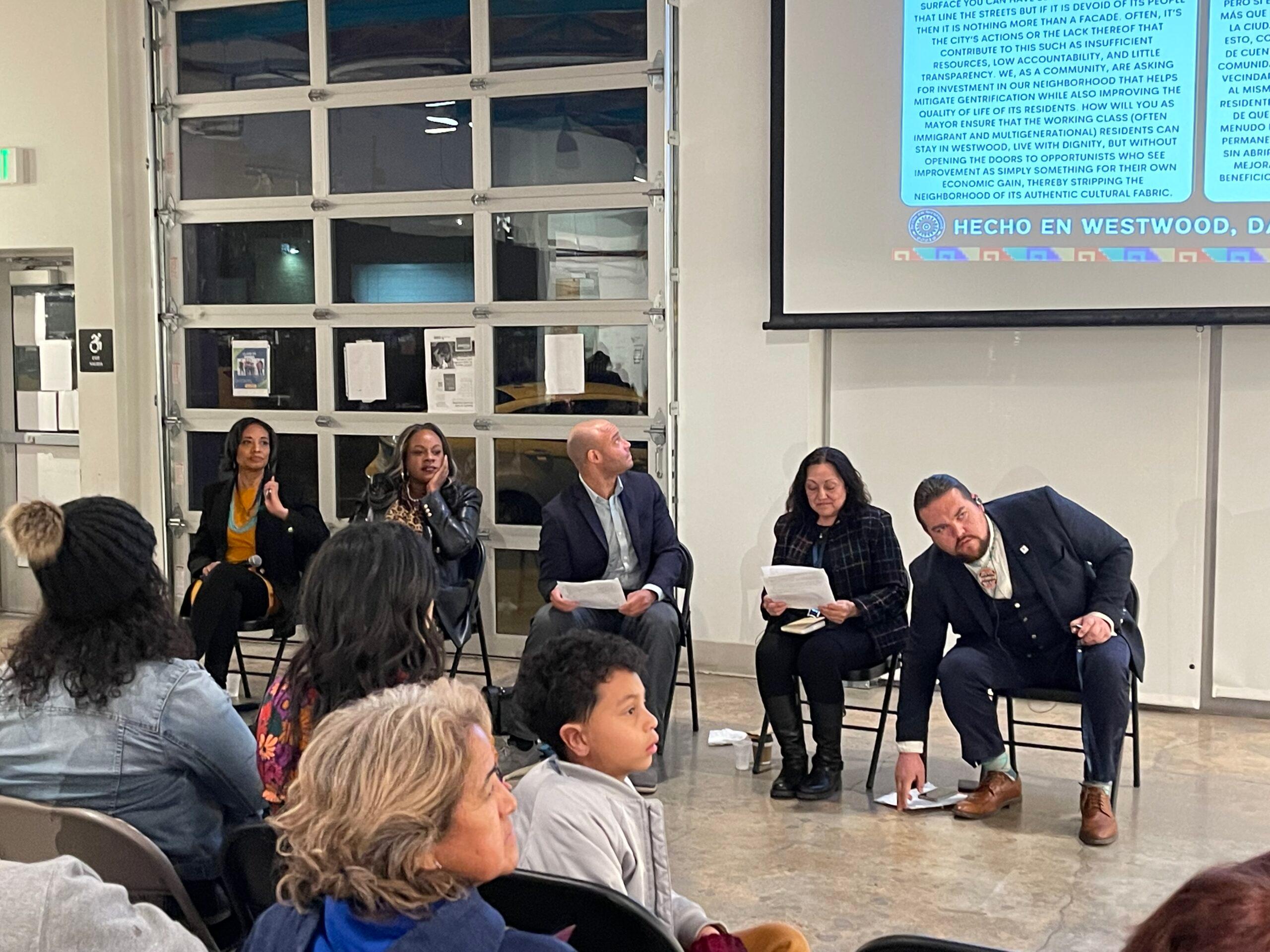Westwood neighbors gathered Friday night to hear six of the 17 Denver mayoral candidates speak to issues facing southwest Denver. The candidates addressed gentrification, struggling neighborhood businesses, food justice, youth violence and transportation.
The forum, which included Lisa Calderón, Leslie Herod, Kwame Spearman, Debbie Ortega, Ean Thomas Tafoya and Trinidad Rodriguez, was hosted by the community organizations Re:Vision and Hecho en Westwood and included questions from other neighborhood-based groups.
"We really focused on our BIPOC mayoral candidates, so that we had our community members as candidates speaking to the community members that we work with," said Mariana Del Hierro, executive director of Re:Vision, a neighborhood-based food justice organization.
Were the white candidates sore they were omitted? As far as Del Hierro knows, they hadn't heard about the event.
The forum was conducted in Spanish, which meant questions were asked in Spanish, and candidates who wore translation devices fidgeted with them, struggling to keep up with the questions.
Outside of a few introductory remarks in Spanish, every candidate answered questions in English.
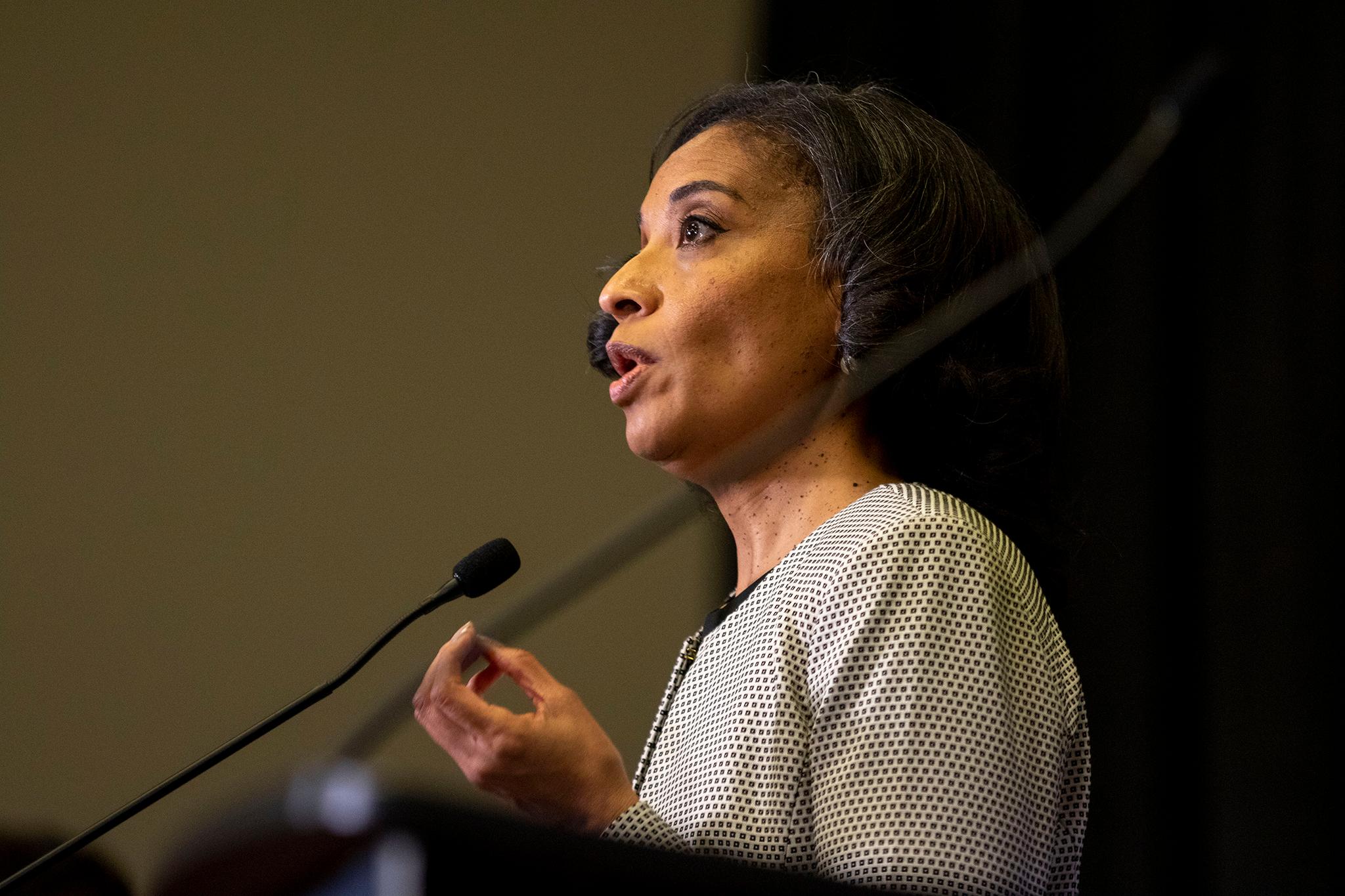
Lisa Calderón
Calderón, who came in third place in the 2019 race to be mayor of Denver, spoke about spending some of her childhood living in public housing in Westwood and taking her daughter, Savannah, to receive medical care in the neighborhood.
Throughout the night, she wove together personal stories of struggling in Denver with her experience running the city's reentry program and her academic knowledge, too.
The reason Calderón ran for office in 2019 was to combat gentrification, she said. "I can't even tell you the loss of our cultural communities that have happened. We know that there are mitigation strategies that we can actually put in place to keep our people here."
Calderón talked about the rigorous application process to buy a home, which she described as a form of "housing discrimination." She told a story of facing foreclosure after taking on a subprime mortgage and lacking city support -- which she said she'd offer residents if elected.
She argued small businesses in neighborhoods like Westwood should be supported by federal dollars administered by the city.
When it comes to food justice, she recalled her mother taking her to picket lines in front of the Safeway, at 26th Ave. and Federal Blvd., when she was five.
The family boycotted grapes. Why? "Because there was blood on them," her mother said.
"I came to understand that even though we lived in the projects, even though we were on food stamps and commodity food, even though we were poor, there was always someone who had less than we did," Calderón said. "And we were on the picket line for the migrant farmworkers who didn't have the protections and rights to stand up for themselves."
Calderón said part of the food insecurity Denverites face involves transportation. Neighborhoods need free circulators to help people get to the grocery store. She also said she'd work to get grocery chains to prioritize opening new locations in neighborhoods like Westwood that have far too often been neglected for wealthier areas.
Calderón herself did not drive until she was 21. As a single parent, picking up groceries with her child on the bus proved challenging.
She said she supports shutting down some streets for bikes. But Calderón also thinks the conversation around transportation should focus more on the needs of elders and children. She would create an Office of Community Engagement to work with communities on their needs.
"We need to ask you all, 'What do you need to be safer,' and create community transportation safety in your neighborhoods, and then we actually enact that plan," she said.
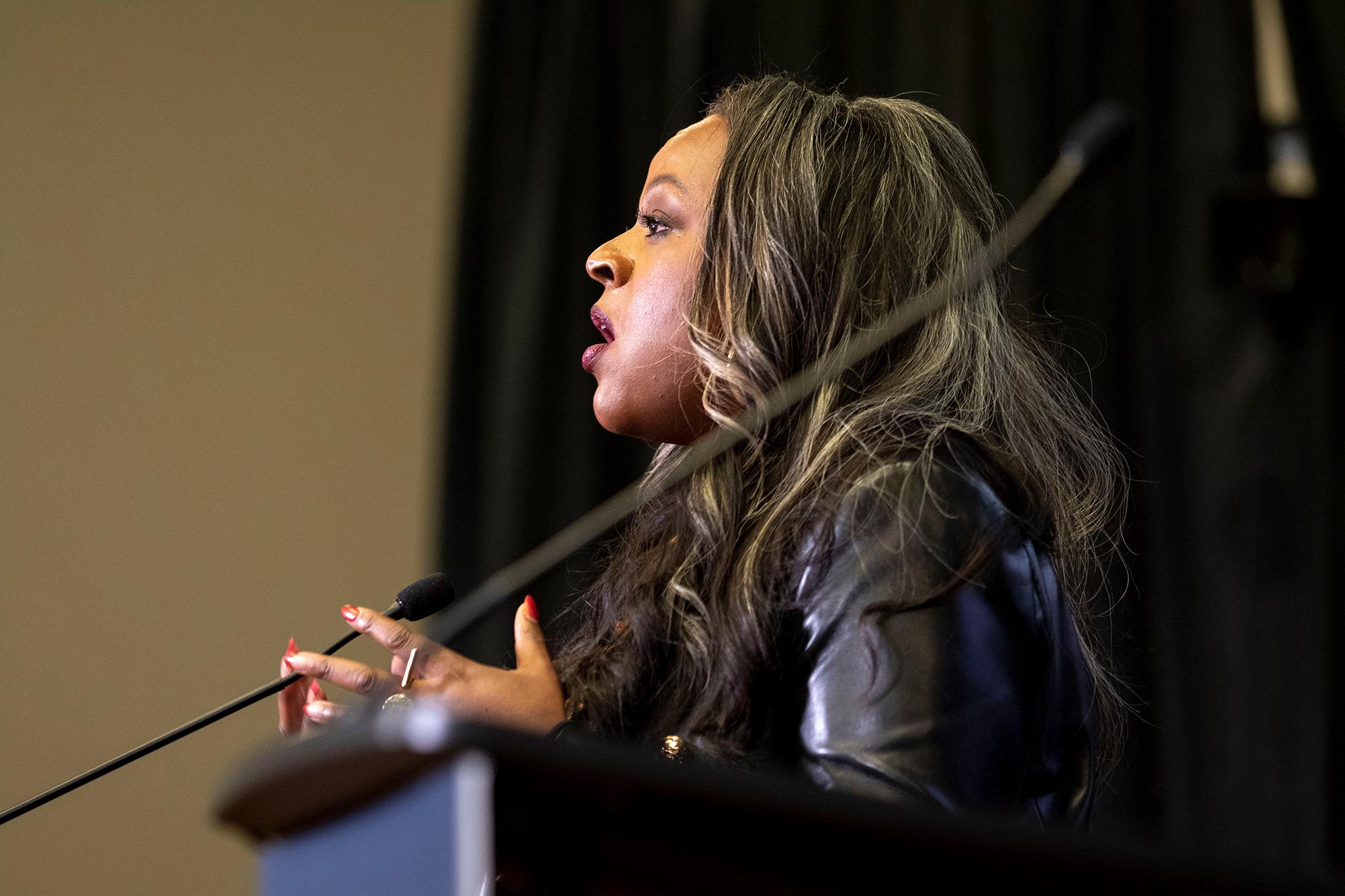
Leslie Herod
Leslie Herod, a representative in House District 8, used her record as a legislator and advocate to show the kinds of policies she would enact as mayor.
She pointed to Caring for Denver, through which taxpayers fund mental-health programming. Re:Vision, the forum's host, was one of the first grantees, she said. Herod also took credit as a co-creator of the STAR program, which sends social workers and healthcare professionals to emergency calls instead of armed law enforcement, when police presence is not needed.
Herod took on gentrification, saying, "For too long, people have been pushed out of our communities, whether it be up in Park Hill or Five Points or right down here. And being told that it's too expensive for me to live in my area that I'm from, and so I'm going to come into your neighborhood.
"And there's so much cultural tourism that's happening, because folks want to take a close look at the beautiful murals, but they don't want to actually invest and engage with the communities that live here," she added.
Herod said, to fight gentrification, the city should invest money into small businesses and use rent stabilization to cap how much somebody pays for a home. Regardless of background or immigration status, every person in the city needs access to justice. She also said the city needs to keep Immigration and Customs Enforcement out of Denver's courtrooms.
Herod talked about the importance of building affordable housing and doing so on public lands.
"Small businesses are the lifeblood of our economy," Herod said, noting that Black- and Brown-owned businesses did not receive equitable federal support during the pandemic. In response, she created a minority-owned small business grant to get capital into communities, she said. She would also support the creation of more co-ops, commissary kitchens and other collective projects.
"I'm a good Democrat," she said. "I do believe that. I'm a great Democrat. But sometimes, man, we like to put bureaucracy on top of bureaucracy on top of bureaucracy, so it doesn't make sense to anyone anymore.
"And right now a lot of our processes and applications don't make sense to anyone," she continued. "So we need to have small business navigators located in every single one of our neighborhoods that are disadvantaged to keep those businesses going, to make sure they know how to access those funds and they know what funds are accessible to us."
Herod talked about her first-hand experience with food insecurity and being on the SNAP program, so she could eat while she was in college. More neighborhoods need offices where people can apply for food assistance, she said.
"We've got to make sure that everyone has access to good nutritious food," she said. "But then on top of that, we have to make sure that those folks who are selling and providing the food are taken care of as well. Because we know that farming, that US farm system is a racist system at its core."
Denver needs programs that invest in neighborhoods with urban farms, to help food producers get through tight months.
Regarding transportation, Herod wants to see neighborhood circulators like the "Hop, Skip, Jump" in Boulder, which she rode while in college.
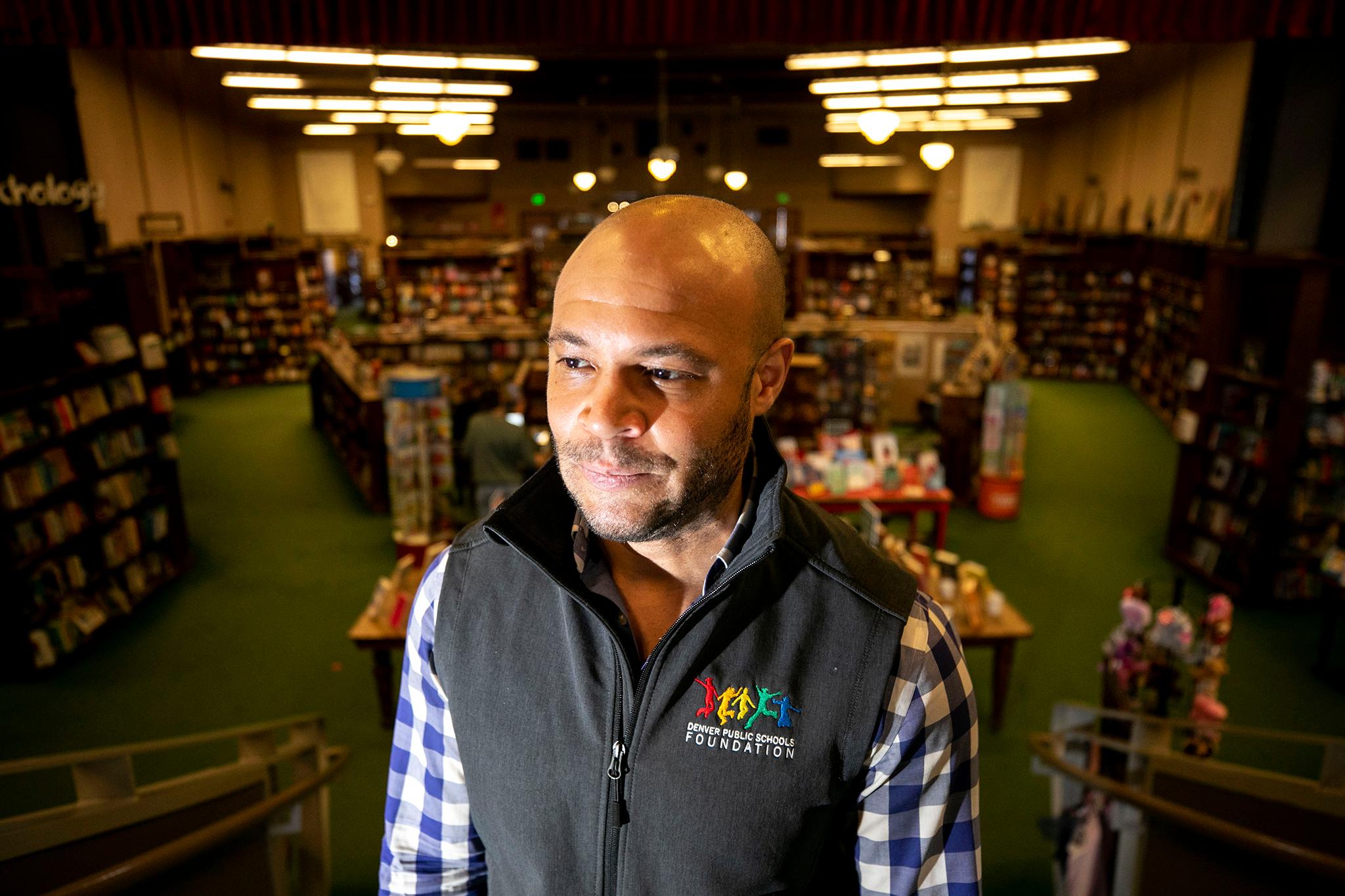
Kwame Spearman
Spearman, the owner of the Tattered Cover, doubled down on his "neighborhood mayor" brand.
Spearman opened up by talking about becoming Denver's neighborhood mayor after a stint as the owner of Denver's "neighborhood bookstore," Tattered Cover. Spearman, who's owned the shop since late 2020, said he wants to listen to the neighborhoods. He also encouraged people to think about what they loved in Westwood.
When he moved back to Denver in 2020, he looked for neighborhoods where Black and Brown's people lived and couldn't find many. So he entered into the race to fight gentrification.
Gentrification is happening, he said, because the city isn't listening to neighborhoods.
"I want to go into your neighbor," Spearman said. "I want to ask you what you think."
He said he would host community conversations about housing, safety and the economy as well as create goals with neighborhoods for city government. And those would be determined by each neighborhood
"You will hold me accountable," he said.
"My whole premise of my vision for Denver is we have to segment our neighborhoods out," he said. "Right now when there's a city plan, there's one plan for the city, more or less. So what I want to do is actually divide our city up, kind of like New York City with the five boroughs and then actually have goals that are specific to those neighborhoods."
The City of Denver already does a version of this through its neighborhood planning process. One difference: Spearman would pay residents to participate in these planning processes to ensure more people can be involved.
He also said he'd tackle affordable housing on a neighborhood-by-neighborhood level.
"We're not just going to build density for density's sake," Spearman said.
His administration would go into neighborhoods like Westwood and ask what sort of architecture people would like and what income level to target.
"Then we're going to give you opportunities to have ownership in those residences, he said. "And we're gonna do neighborhood by neighborhood.
He also proposed cutting taxes, setting goals and deadlines for permitting at the city's planning department and creating a bank for small businesses that have emergencies.
"If we want this to be the greatest city in the nation, no single person can be food insecure," Spearman said.
His plan? No surprise: Fix it neighborhood by neighborhood, he said. "We can go into those neighborhoods and provide the type of food that they need."
When it comes to safety, he plans to address crime by increasing after-school activities and sports.
Spearman, who said he can't remember the last time he rode public transportation in Denver, said, "RTD options are not safe. They are not accessible, and they don't get us where we need to go."
Instead, he'd propose neighborhood micro-transit options and consider creating a Denver-based transit alternative to RTD to ensure people can get to work, school and the grocery store.
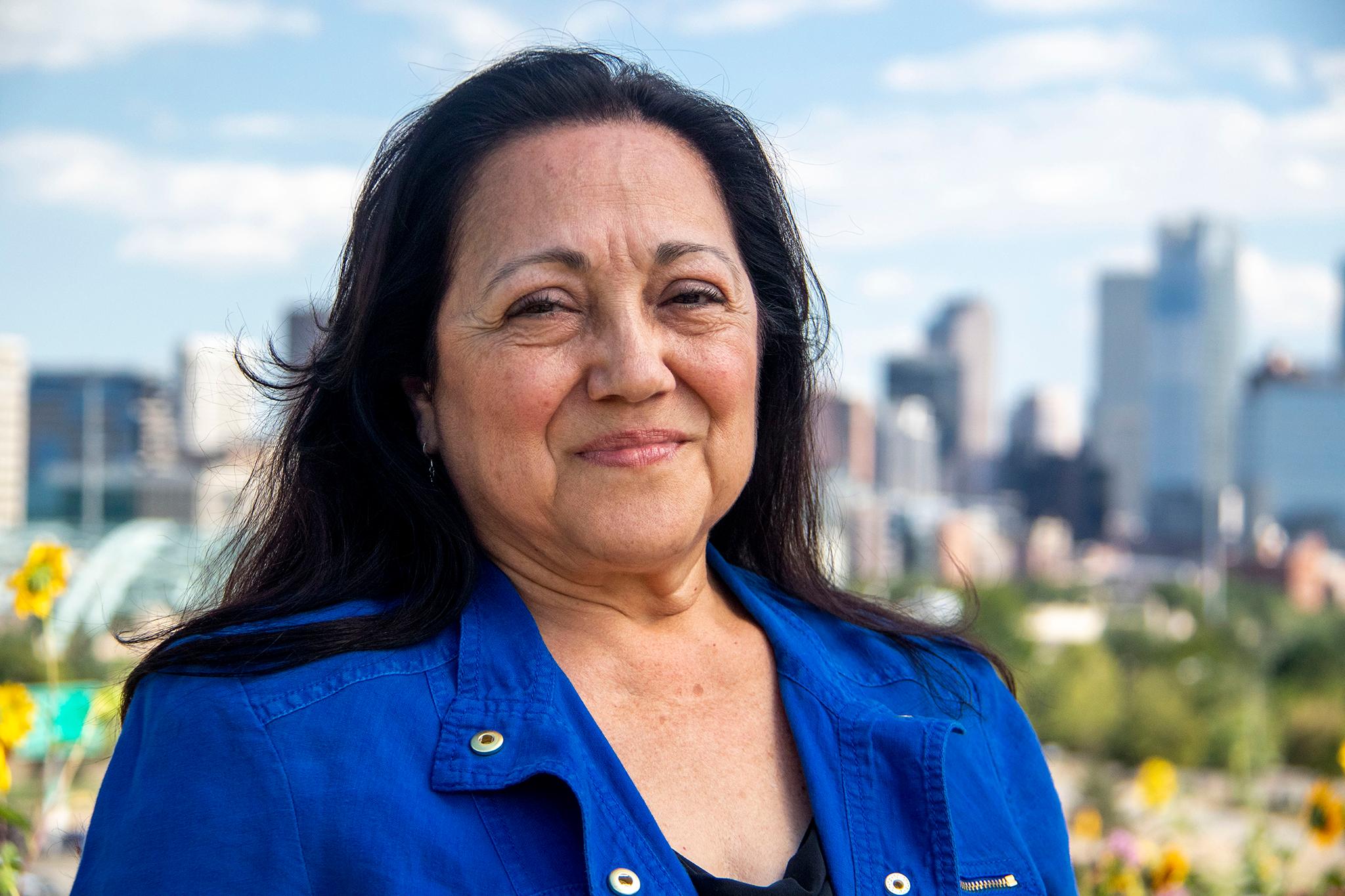
Debbie Ortega
Councilmember Debbie Ortega talked about landing in Westwood after moving from New Mexico to Denver as a child. She described her nearly 28 years on City Council as a district and at-large representative.
"I'm running for this position because I think, now more than ever, the city needs someone that understands how the city works and has been involved in so many issues," she said.
She discussed collaborating with former City Councilmember and current Clerk and Recorder Paul Lopez along with the community to create a new rec center in Westwood. She also talked about working to fund a nearby health clinic.
When asked about gentrification, she talked about many of the large developments being planned along the I-25 corridor, from I-70 to Mississippi Ave., and how she's spoken to the housing office about the impact those "millions and millions of square feet" will have on the neighborhoods on the westside. She's asked what sorts of programs need to be in place to prevent displacement and protect locals.
Ortega talked about the eviction defense and rent and utility assistance programs she has passed to keep people in their homes.
On addressing the housing crisis, she talked about the importance of homeownership counseling. She wants to equip people with the knowledge they need to save for a downpayment and apply for assistance programs.
Ortega also talked about rezoning parts of the city to allow accessory dwelling units to help homeowners build wealth and house their families.
She wants the city to shift its focus from luring large corporations from out of state and instead double down on backing local businesses.
"Our small businesses are the backbone of our economy," Ortega said. "They employ many people. And they're providing services in our neighborhoods. We have to have programs to keep them thriving and alive in our neighborhoods."
While the city has an Office of Economic Development that supports businesses, "We need to make sure we're supporting the businesses who are here before we keep bringing more from out of state," she said.
She also wants to see more training programs for people looking to enter trades like construction.
If elected, Ortega would create a citywide plan to address food insecurity, and she said she supports urban farming projects like Re:Vision.
Ortega makes regular school appearances to speak with youth about career possibilities and hopes other adults do the same. She sees that as one way of deterring youth violence. She also addressed the uptick in youth suicide and mental health issues by saying the city needs more programming.
Several years ago, the Denver School District took police officers out of the schools. She thinks that was the wrong move.
"I want to make sure we continue to keep our schools safe. So, when kids come to City Council, and they are asking us for help to make sure that their school resource officers are put back in their schools, we need to listen to them," Ortega said.
Ortega is a fan of the electrification of cars and e-bikes. She proposed using micro-transit solutions and ensuring every neighborhood, including Westwood, has access to scooters and e-bikes, as one way to clean up the air. She said that when budgeting for new projects, her administration would focus on equity.
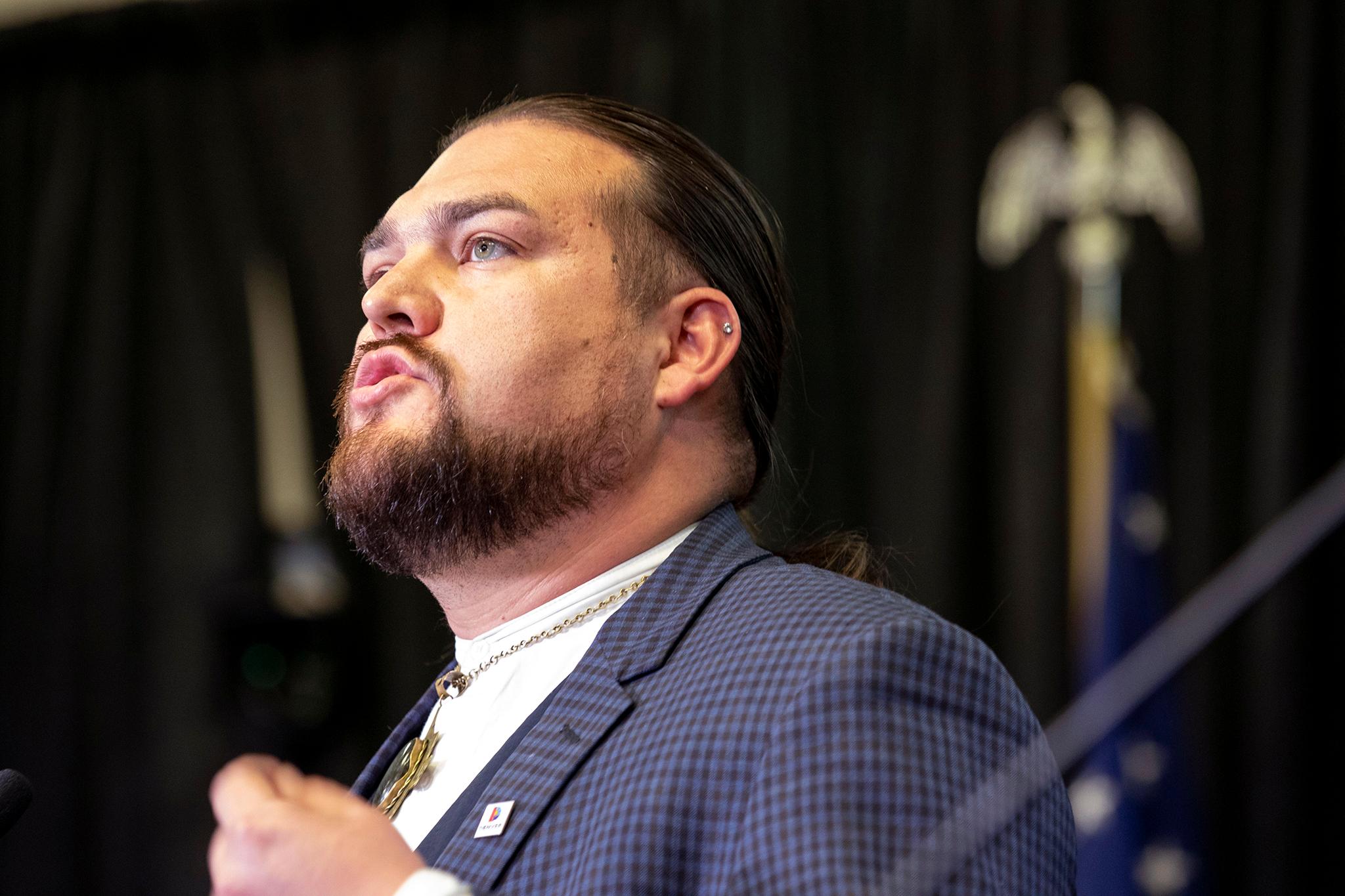
Ean Thomas Tafoya
Tafoya has deep experience as an environmental activist with big wins. He spoke about the importance of healthy food, water and air.
He also touted his two victories in the Westwood hot-chili eating contests. The man has eaten his way across contests citywide, and he's rarely been defeated.
Tafoya says Denver can welcome all immigrants who want to live here. He also encouraged people in attendance to show up to the Statehouse and fight for rent control.
To address the housing crisis, he wants to fix the permitting department cutting wait times for affordable housing developers. He wants to see the city invest in community land trusts and cooperative housing models and would also build on the land the city owns. He supports financing housing and other needs with a public banking system.
"People need access to funds when their windows get broken," Tafoya said. "These are the emergencies that people face. We want to advance our society for accessibility for all. And when your landlord won't let you widen your door and puts that burden on you, we have to find a way that makes this a more equitable society."
He said it's time to stop building affordable housing near interstates and other pollution.
"It's brown air for brown people," he said. "It's time to change that."
Tafoya supports rent control for individual households and small businesses struggling to keep up with rent.
A former member of the Westwood food co-op, Tafoya said he supported the creation of food forests, urban farms and more food co-ops citywide.
Violence, as he explained, comes from both the state and communities. When Tafoya was 14, he was misidentified by a police officer who pulled a gun on him. Tafoya concluded that police aren't always the right answer for making people safe.
He wants communities to have more say about where safety resources are invested in their neighborhoods.
"Poverty is one of the number one indicators for violence in our communities," Tafoya said. "And if we can work and have the police interact with our children unnecessarily less often then they can focus on other forms of crime, like solving cases of violence in our community, the crisis of missing and murdered indigenous women and so much more."
Tafoya grew up riding public transportation. Part of what made that possible was that the busses came more often. He wants to see that regularity return. Drivers need to be better treated and paid. Riders need access to basic amenities that create dignity: water and restrooms.
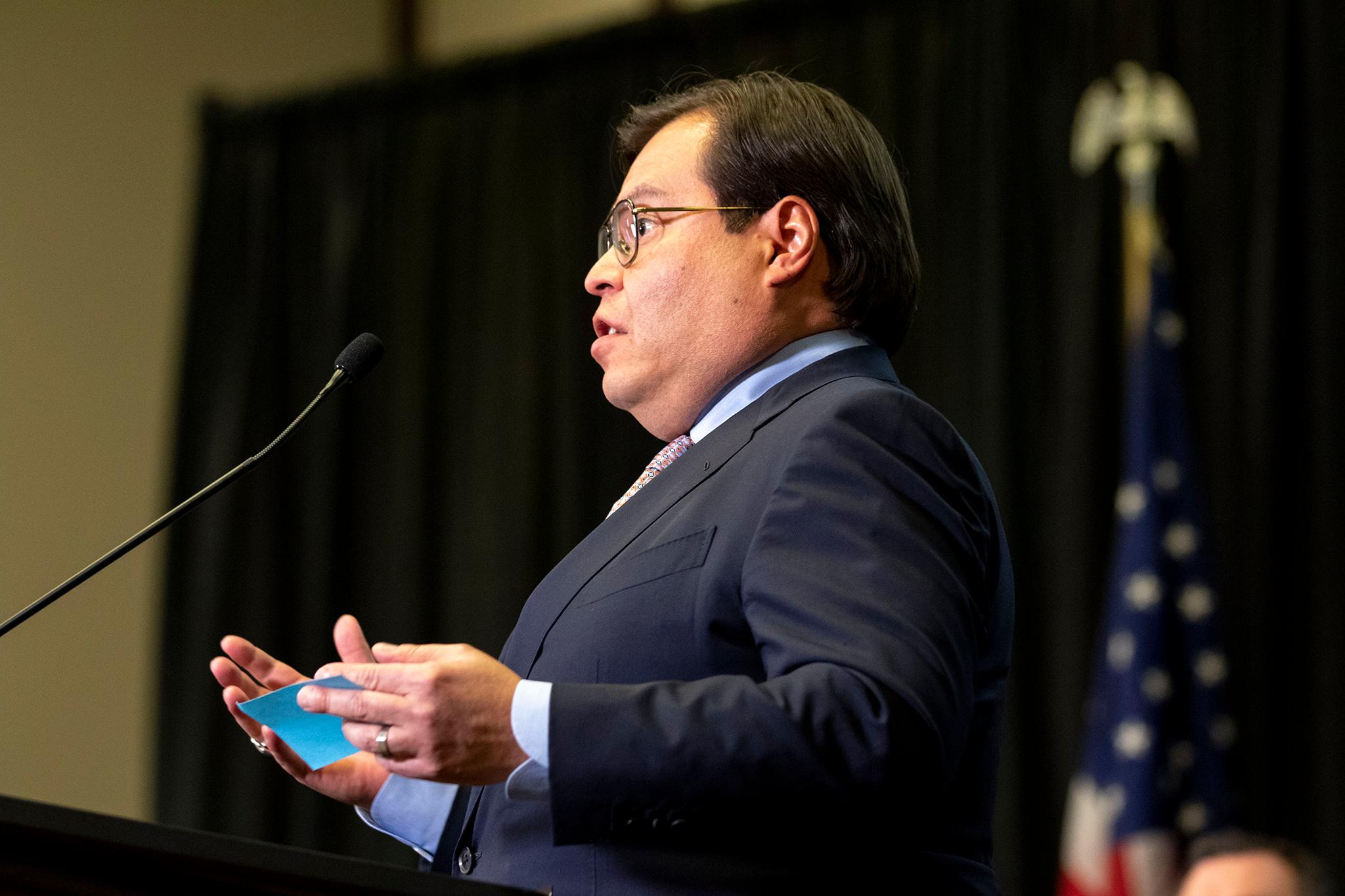
Trinidad Rodriguez
Rodriguez described himself as the son of a hardworking mom raised in public housing. His mom, political heavyweight Rosemary Rodriguez, serves as his campaign chair. The City of Denver helped them survive hard times, and eventually, he decided to give back, working for over 25 as a city builder and financier.
His vision for ensuring people in Westwood can afford to stay in Westwood is by creating a housing ladder that starts with communal housing. From there, people could enter the rental market and eventually take advantage of affordable and attainable home ownership through land trusts.
That way people "could grow their economic standing in our community," he said.
Rodriguez also proposed a "membership model for housing acquisition" that could cross municipal lines. People in Westwood could pay into an organization that advances its interests and goals in attaining housing ownership.
"We need to create more voices for your community to be able to shape the policies that actually come out of Washington, D.C. and the banking centers," Rodriguez said. "And by pooling your resources and your voice with similar communities around the U.S., I see an ability to, for the first time, have a voice at the table when potentially destructive policies and housing finance are being developed. I'm excited about organizing that type of joint movement."
How would Rodriguez support small businesses? He'd hire more police to protect them from vandalism and develop an app to make interfacing with the city easier.
His goal: "cutting red tape."
Regarding addressing food insecurity without relying on federal programs like SNAP, Rodriguez would identify a market for land where food could be grown in town. Growing food in the community will decrease reliance on the supply chain and cut out the costs of middlemen who profit from the agricultural industry through third-party delivery.
"With the focus on equity and food and increasing food security, I know we can actually increase the health of our communities with this access to highly nutritious foods," Rodriguez said.
To combat youth violence, Rodriguez wants to transform the relationship between the City of Denver and Denver Public Schools. Too much of the city's children's success is hinged on the school system, and the city should take more ownership.
One idea: Expanding ways police can positively interact with youth through programs like the Police Athletic League.
Rodriguez also wants to create "a comprehensive mobility system.
"We have limited space to actually create more capacity for cars, so we must invest in more efficient modes of transportation, including protected bicycle infrastructure and pedestrian infrastructure," Rodriguez said.
"However the key, in my vision, is to actually create Denver as a center for self-driving people movers -- prioritizing the use of self-driving technology as mass transit that will actually connect our neighborhoods rather than just our region."
He said the self-driving vehicles will be cheaper than traditional public transit. He said, they will allow more frequent and localized service so people can rely on alternatives to single-vehicle transportation.
As people shuffled out of the forum, the organizers reflected on the event's success.
"The communities that we work with are the ones that are most impacted in terms of systemic negligence," Del Hierro said. "And so we wanted to make sure that our candidates really got direct experience with our communities, and our communities had the ability to directly address the candidates and share their concerns."
Del Hierro said she's looking forward to the next forum, if there's a run-off.
"We are very much interested in planning to have an additional forum," she said. "And so there is plenty of opportunity then to include other candidates."
The election will take place on April 4. Assuming nobody receives more than 50% of the vote, the top two vote-getters will compete in a June 6 run off.

